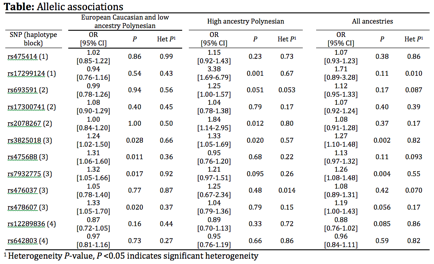Session Information
Session Type: Abstract Submissions (ACR)
Background/Purpose: There are genetic variants in urate transporters SLC22A11 (OAT4) and SLC22A12 (URAT1) that influence serum urate levels in European Caucasian. However, there is no consistent evidence for association with risk of gout. The aim of this study was to test genetic variation across the SLC22A11 and SLC22A12 locus for association with gout risk in New Zealand sample sets. The sample sets include Māori and Pacific Island (Polynesian) participants, who exhibit higher prevalence and more severe gout than European Caucasian.
Methods: Twelve single nucleotide polymorphism (SNP) variants in four haplotype blocks were genotyped using TaqMan¨ and Sequenom MassArray in 1003 gout cases and 1156 controls. Gout was classified according to the 1977 American Rheumatism Association criteria. Association analysis of single markers and haplotypes was done using PLINK and STATA.
Results: SNP rs17299124 (upstream of SLC22A11) in haplotype block 1 was associated with gout in the Polynesian sample sets with higher Polynesian ancestry, but not in Maori and Pacific with lower Polynesian ancestry and European Caucasian (OR=3.38, P=0.001; OR=0.94, P=0.54, respectively) (Table). A protective block 1 haplotype, rarer in Polynesian, was driving the association (OR=0.28, P=0.001). Within haplotype block 2 (SLC22A11) we could not replicate previous reports of association of rs2078267 with gout in European Caucasian and people with lower Polynesian ancestry (OR=1.00, P=1.00), however this SNP was associated with gout in people with higher Polynesian ancestry (OR=1.84, P=0.012). Within haplotype block 3 (including SLC22A12) there was evidence for association for SNP rs3825018 in all ancestral groups (OR=1.27, P=0.002). Analysis of haplotypes revealed a haplotype with trans-ancestral protective effects (OR=0.80, P=0.004), and a second haplotype conferring protection in the less admixed Polynesian sample sets (OR=0.63, P=0.028) but risk in European Caucasian samples (OR=1.33, P=0.039).
Conclusion: Our analysis demonstrates several ancestral-specific effects across the SLC22A11/SLC22A12 locus indicating that multiple common variants influence the activity of both OAT4 and URAT1 in relation to risk of gout. These results clarify some of the previous inconsistent gout associations seen, and indicate that further fine mapping of the association signal is needed.
Disclosure:
T. R. Merriman,
None;
A. Phipps-Green,
None;
J. E. Hollis-Moffatt,
None;
M. E. Merriman,
None;
R. Topless,
None;
G. Montgomery,
None;
B. Chapman,
None;
L. K. Stamp,
None;
N. Dalbeth,
None;
T. Flynn,
None.
« Back to 2013 ACR/ARHP Annual Meeting
ACR Meeting Abstracts - https://acrabstracts.org/abstract/association-analysis-of-the-organic-anion-transporter-4-and-urate-transporter-1-locus-with-gout-in-new-zealand-case-control-sample-sets-reveals-multiple-ancestral-specific-effects/

